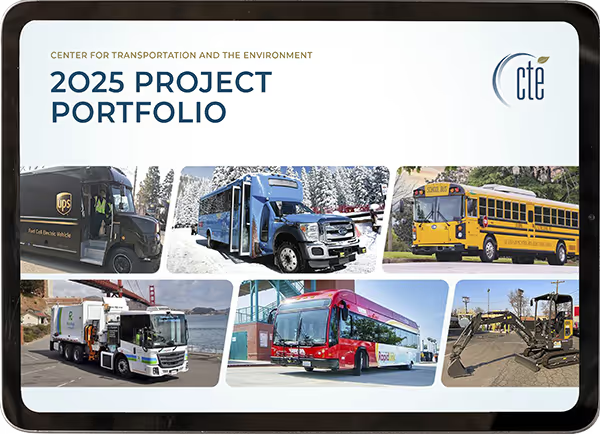Mission & Impact
Founded in 1993, the Center for Transportation and the Environment (CTE) is a member-supported 501(c)(3) non-profit organization that develops and implements zero-emission vehicles and supporting infrastructure.

Our Mission
To improve the health of our climate and communities by bringing people together to develop and commercialize clean, efficient, and sustainable transportation technologies
Our Vision
A sustainable transportation ecosystem free of harmful emissions
CTE’s Impact
What’s at Stake?
A rapidly changing climate has the potential to drastically impact our lifestyles, markets, and interactions both domestically and around the world.






What’s at Stake?
A rapidly changing climate has the potential to drastically impact our lifestyles, markets, and interactions both domestically and around the world.
Climate
The introduction of greenhouse gasses into our atmosphere drives the warming phenomenon responsible for our rapidly changing weather systems. While there are many ions, in the United States, accounting for nearly 30% of greenhouse gas in the country warming phenomenon
Health
The introduction of greenhouse gasses into our atmosphere drives the warming phenomenon responsible for our rapidly changing weather systems. While there are many ions, in the United States, accounting for nearly 30% of greenhouse gas in the country warming phenomenon
Equity
The introduction of greenhouse gasses into our atmosphere drives the warming phenomenon responsible for our rapidly changing weather systems. While there are many ions, in the United States, accounting for nearly 30% of greenhouse gas in the country warming phenomenon


Services
CTE has deep experience developing, implementing, and administering advanced transportation technology projects, with a focus on medium- and heavy-duty vehicles. We work with vehicle manufacturers, component providers, and fleet operators, including transit agencies and logistics organizations across the country. We take technology from concept to commercialization through our services:
Project Spotlights
Transit Vehicle Innovation Deployment Centers: CTE's Impact on Transit Innovation
In 2017 CTE was selected to manage FTA’s Zero-Emission Research Opportunity, later evolving into Transit Vehicle Innovation Deployment Centers (TVIDC). With an initial obligation of $1.375 million in 2018, Congress allocated an additional $10 million to TVIDC in FY22 and $3.6 million in FY24.
Under the TVIDC program, CTE is poised to deliver an ambitious portfolio of projects that accelerate the adoption of advanced technology transit solutions. This body of work encompasses a variety of innovative initiatives, including the integration and bench testing of cutting-edge fuel cell propulsion systems, market evaluations, and extensive trade studies. Each project is designed to address critical barriers to advanced vehicle technology adoption, such as cost, durability, and performance, providing comprehensive solutions for transit agencies. CTE's efforts will also include detailed project management, stakeholder engagement, and data collection and analysis, ensuring that each initiative contributes valuable insights and actionable outcomes to propel the industry forward.
NorCAL Zero Fuel Cell Electric Trucks
CTE organized a team of 16 key industry and community partners to obtain over $29 million in state and federal grants matched by an additional $25 million in private funding to launch the largest deployment of Class 8 FCETs in North America. Thirty fuel cell electric trucks (FCETs) are carrying freight to and from the Port of Oakland, to warehouses and distribution hubs in the San Francisco Bay Area, Sacramento, and California’s Central Valley.
Additionally, as part of the project, CTE managed the build of a heavy-duty hydrogen fueling station (one of the largest in the world) at the East Bay Municipal Utility District’s Wastewater Treatment facility in Oakland, with the capacity to support 60 trucks in regular service. The project also includes a community outreach program in partnership with the University of California at Berkeley and the West Oakland Environmental Indicators Project, upgrades to maintenance facilities, and workforce training to provide service and support for the vehicles.


“The deployment of these trucks in northern California provides a groundbreaking opportunity to demonstrate the exceptional performance of fuel cell electric trucks for an industry that has traditionally relied on conventional diesel and CNG vehicles….We look forward to being a part of a new era for trucking across the U.S. – one marked by zero-emission vehicles that don’t force fleets to compromise on performance.”







.avif)





